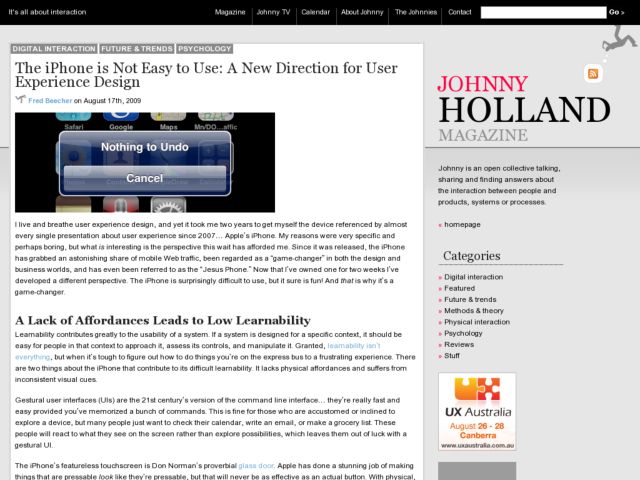Fred Beecher wrote the excellent article "The iPhone is Not Easy to Use: A New Direction for User Experience" on Johnny Holland to talk about why the iPhone is not easy to use (at first), and why it changes the game for user experience designers. The examples illustrate how gestural interfaces are hidden, and lack the affordances of physical buttons. But the real story here is how the iPhone brings one thing to the experience that is more important than usability—fun.
As a user experience designer, I thought my job was to make things not suck. Until recently. As technology has evolved, human behavior has evolved along with it. Since behavior is the basis of user experience design, my job has evolved as well. Now, my job is to make things people love. At the 2009 IA Summit, Karl Fast articulated the value proposition of user experience design with sparkling clarity. “Engineers make things,” he said, “we make people love them.” And then he held up an iPhone as an example.
This is a crucial change, the importance of which cannot be overstated.
It's cool to me that creating pleasurable and fun experiences has become such a meme because the issue of usability has become less important when compared with the feel of the product. It's always there in terms of principles, but I personally never want to lean on it as a crutch when designing. I think we sometimes equate usability with sterility and boredom. This is an odd thing to see myself write, since I've spent so much of my time trying to design usable things, or make things other people create more usable.
I think the point about finding fun and exploiting the users' willingness to play are key. Having an 8 year old son that is really into games of every type (card, board, video, and schoolyard games) has helped me gain a different perspective on interface design. It's not just in terms of seeing his immediate adaptability to the iPhone without the burden of reference to older interfaces. Most kids from pre-literacy learn to push and pull buttons and screens right away until something happens. But what I've been experiencing is how a child's curiosity, continual exploration and willingness to absorb information and fail quicker to get to desired goals is such a positive thing in terms of the learning experience.
One thing that has also immersed me in all of this fun learning is that we homeschool our son here in NYC. I've used gaming a great deal as a part of the learning experience with my son. I went through a period years ago when he was very young where I read Got Game and Everything Bad is Good for You. Our son talked us into getting him a GameBoy Advance so he could play with an older child, and my wife and I thought, "Why not make it part of his learning experience?" And we've been doing that with whatever he becomes interested in.
It's great that Fred mentions the game Fluxx. We've been playing this game all summer, and I bought blank cards to make our own rules. To my son, games aren't just about accomplishing goals and earning stuff, they're also largely about becoming an actor in the story and taking that experience to think of new games he wants to create. Fluxx is a great example of a game that lets users become more active participants in the rules.
MMPORG games immerse the gamer in a world where the player is part actor. SIM games like Spore bring God-like power to gamers. Games with creation mode like Little Big Planet allow users to re-cast the rules and experience. All of these create a different kind of user mentality that will be more interested in not only exploring the hidden, pleasurable world of easter egg interfaces, but who will also want to do more, explore more, and view computers as social and recreational tools as much if not more than tools to get things done. And that opens up the range of elements and methods you can use in interfaces.
These are great challenges. On my last large project I spent a lot of time working on game interfaces to push creation of user generated content within a video watching community. A few years after leaving, I see that none of that experimental work got to see the light of day. But I found the experience of thinking about how playfulness and even play within the application could make the use more pleasurable and as a designer it was incredibly exciting. I've jumped into a totally different world—enterprise software—where the challenge to make the experience pleasurable is even greater, and the implementation of these types of UIs more subtle.
I think what I take away from Fred's article is that we can't overlook the value of play, and I would add that empathy for the different experience of the younger generations who value things and possibly approach using things differently than we might. For more on this topic, read Fred Beecher's article in Johnny Holland.
http://johnnyholland.org/magazine/2009/08/the-iphone-is-not-easy-to-use-a-peek-into-the-future-of-experience-design/
